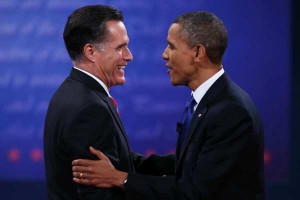President Obama vs. Mitt Romney
Two tiny villages in northern New Hampshire kicked off the 2012 election by casting the first votes early Tuesday.
President Obama and Republican Mitt Romney each won 5 votes in Dixville Notch, and in Hart’s Location Obama won with 23 votes, Romney received 9 and Libertarian Gary Johnson received 1 vote. The towns have enjoyed first-vote status since 1948.
Meanwhile, Romney was taking his nearly six-year campaign for the presidency all the way to Election Day, making last-minute plans to visit two vital battlegrounds on Tuesday, while Obama held a nighttime rally in Iowa Monday.
The event (which is expected to be the last official campaign stop of the president’s political career) was held in the same state where a 2008 caucus victory jumpstarted his road to the White House.
The president was photographed weeping as he spoke before a crowd of 20.000 supporters, telling them “this is where our movement for change began.”
Mitt Romney has always had difficulty drawing a winning Electoral College hand. Even during his best period of polling, in the week or two after the first presidential debate in Denver, he never quite pulled ahead in the polling averages in Ohio and other states that would allow him to secure 270 electoral votes.
But the most recent set of polls suggest another problem for Mr. Romney, whose momentum in the polls stalled out in mid-October. Instead, it is President Obama who is making gains.
Among 12 national polls published on Monday, Mr. Obama led by an average of 1,6 percentage points. Perhaps more important is the trend in the surveys. On average, Mr. Obama gained 1,5 percentage points from the prior edition of the same polls, improving his standing in nine of the surveys while losing ground in just one.
Because these surveys had large sample sizes, the trend is both statistically and practically meaningful. Whether because of Hurricane Sandy, the relatively good economic news of late, or other factors, Mr. Obama appears to have gained ground in the closing days of the race.
After a final cross-country campaign whirl by both candidates, President Obama heads into election day riding a slim lead in enough key states to secure a second term, while Mitt Romney remains competitive and could yet unseat him.
National polling showed late voter movement toward Obama, raising the possibility that the election might not drag out for days and weeks of wrangling over disputed ballots, as some feared. The president continued to maintain a slight edge in the vast majority of swing-state opinion polls, though his advantage typically remained within the surveys’ margins of error, leaving the contest statistically tied.
An Obama reelection could shape a status-quo narrative of continued divided government in Washington. If Romney prevailed, 2012 would become the fourth national change election in a row, including the Democratic takeover of Congress in 2006, Obama’s 2008 victory and the Republican return to power in the House in 2010.
“I actually think the question of this election comes down to this – Do you want four more years like the last four years. Or do you want real change?” Romney said Monday to chants of “Mitt! Mitt! Mitt!” at a rally in the northern Virginia suburbs outside Washington. The Republican asserted, as he has throughout a six-year quest for the presidency, that his record as a successful businessman, Winter Olympics chief and one-term governor of Massachusetts qualified him for the nation’s highest office.
